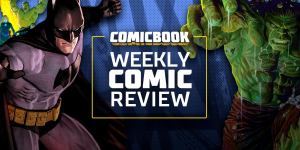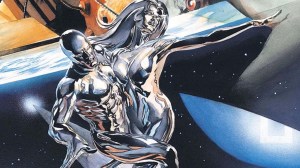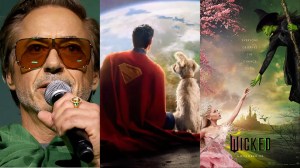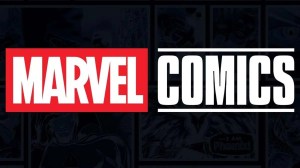Cover-dated November 1961, Stan Lee and Jack Kirby’s The Fantastic Four hit newsstands 55 years ago and the world of comic book superheroes was changed forever. Prior to its release and subsequent success, Stan Lee had grown increasingly frustrated with the comic book medium and the recently dubbed “Marvel Comics” was limping along creatively. With Fantastic Four’s almost immediate embrace by an expanding readership, Lee’s enthusiasm for comics was reignited and Marvel was transformed from floundering publisher to power-packed purveyor of some of the most exciting and energetic comic book masterpieces to ever grace a spinner-rack. For his part, Kirby would make the comic medium sing in ways that had never even been dreamt of before.
Videos by ComicBook.com
Today, we see a landscape where no comic currently being published bears the title Fantastic Four, two of the team’s members (Reed “Mister Fantastic” Richards and Susan “Invisible Woman” Richards) are entirely absent from the Marvel Universe, Johnny “The Human Torch” Storm is palling around with the Inhumans, and Ben Grimm is about to be shuffled off the Guardians of the Galaxy. It seems it’s up to the “Keepers of the Faith” outside of Marvel to celebrate this milestone. As such, this month of November will see a number of fans, professionals, and commentators reflect on Marvel’s First Family.
So join us, O Frantic One, as we speak to Action Comics writer Dan Jurgens.
Best known for his decades of work with DC Comics, ranging from Warlord and Green Arrow to Booster Gold (who he created) and Superman (who he killed and brought back), Jurgens spent a chunk of time in the late ’90s and early 2000s working for Marvel on titles like Captain America, The Sensational Spider-Man, and Thor.
In 1999, he wrote Superman/Fantastic Four, which crossed the Man of Steel into the Marvel Universe to help the team take on Galactus.

Mr. Jurgens, you’re a comic book writer and artist who has firmly cemented for himself a legacy in the medium. You’ve worked for DC most notably but also for Marvel Comics, Dark Horse, Valiant, and possibly more. What, if any, place does the Fantastic Four and the comics they’ve appeared in have in your formative comics experience and education?
I’ve always loved the FF. Conceptually, they’re about as good as it gets.
Who is your favorite member of the Fantastic Four?
The character that’s the most fun to write is Ben Grimm, for obvious reasons, but Reed is probably my favorite character. He’s leader, friend, husband, father and chief brain, all in one.
This November is the 55th Anniversary of the Fantastic Four’s first appearance by cover date. This is also the first fairly notable anniversary we’ve seen where they aren’t being featured in a Marvel Comic in any way, shape, or form. What reflections does that inspire in you?
Seems a shame, but I’m sure there are a number of factors involved in that decision that I’m generally unaware of.
The character you’re most known for working with is Superman. You’re the architect of his death and now a very well-received Rebirth. He is a character with a place in the American psyche far beyond his place in the mind of hardcore comics readers. He is rich with evolving meaning and symbolism. I’m sure none of that escapes you. From your perspective, what meaning does the Fantastic Four hold at their core?
At its core, the FF is a family book. I mean, it really comes down to the fact that they’re a family, right? It could be argued that many of America’s best values and traits are built on the ideas of a strong family… of being able to overcome long odds while be supporting of each other. Lots to draw from there.
Do you have a favorite Fantastic Four story, arc, or creative team?
The Galactus trilogy, which ran from FF #s 48-50 is still my favorite story. It introduced Galactus and the Silver Surfer, all the while elevating the FF to a whole new level. It’s a brilliant piece of work.
You brought Superman together with the Fantastic Four for an excellent crossover in 1999, Superman/Fantastic Four. You both wrote and drew this oversized one-shot, delivering a great story enjoyable by fans of either property. What was it like taking two flagship properties and putting them into one book over which you had so much creative influence?
Oh, it was an absolute joy to do Superman/FF. It’s a project we had discussed for quite some time and it seemed like we might never get the chance. Eventually, all the pieces fell into place so we could get it done. And, to make it even more special, we were able to do it Treasury Sized! For me, that was key.
How do you think Franklin Richards and Jon Kent would get along if given the chance?
I think it’s a story I’d love to get to do one day!
It’s often said that the Fantastic Four when they debuted were revolutionary in the comics world, that they were different than anything on the stands. Generally, it’s specifically cited that they were dramatically different from DC’s output at the time. With the FF, Stan Lee and Jack Kirby are generally credited with beginning the elevation of the medium and introducing more complex characters/stories. Do you think this is their most important legacy? Do you think it’s entirely deserved?
I tend to think so, because it was obviously quite different at the time. And, even more importantly, it became more and more different as it ran. In the beginning, there were some obvious similarities to a couple of DC approaches but it moved away from that and became very much its own thing.
Looking ahead, what would be your greatest hope for the FF property in the future?
Good, entertaining stories. That’s the goal for any book!





